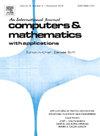带噪声数据逆问题的物理约束深度核学习
IF 2.5
2区 数学
Q1 MATHEMATICS, APPLIED
引用次数: 0
摘要
我们提出了一种新的物理约束深度核学习(PCDKL)来估计物理参数并学习由偏微分方程(PDEs)和噪声数据描述的问题的前向解。在此框架中,构造了一个带深度核的高斯过程(GP)来对正解进行建模。GP的后验函数样本作为PDE解决方案的替代品。这些GP后验样本受到两种可能性的约束:一种是为了适应有噪声的观察结果,另一种是为了加强与控制方程的一致性。为了高效、有效地推断深度核和物理参数,我们开发了一种基于证据下界(ELBO)的随机估计算法,该算法作为后验正则化目标函数。通过与贝叶斯物理信息神经网络(B-PINN)的系统比较,证明了所提出的PCDKL的有效性,B-PINN是解决带噪声观测的PDEs逆问题的最先进方法。我们的实验表明,PCDKL不仅可以获得与B-PINN相当的信息不确定性估计的正演解,而且可以产生准确的物理参数估计。这些结果表明,PCDKL在正演解的不确定性量化和精确的物理参数估计方面具有重要的潜力,具有实际应用价值。本文章由计算机程序翻译,如有差异,请以英文原文为准。
Physics-constrained deep kernel learning for inverse problems with noisy data
We propose a novel physics-constrained deep kernel learning (PCDKL) to estimate physical parameters and learn forward solutions for problems described by partial differential equations (PDEs) and noisy data. In this framework, a Gaussian Process (GP) with a deep kernel is constructed to model the forward solution. The posterior function samples from the GP serve as surrogates for the PDE solution. These GP posterior samples are constrained by two likelihoods: one to fit the noisy observations and the other to enforce conformity with the governing equation. To efficiently and effectively infer the deep kernel and physical parameters, we develop a stochastic estimation algorithm based on the evidence lower bound (ELBO), which serves as a posterior regularization objective function. The effectiveness of the proposed PCDKL is demonstrated through a systematic comparison with a Bayesian physics-informed neural network (B-PINN), a state-of-the-art method for solving inverse problems in PDEs with noisy observations. Our experiments show that PCDKL not only achieves forward solutions with informative uncertainty estimates comparable to B-PINN, but also yields accurate estimates of physical parameters. These results suggest that PCDKL has significant potential for uncertainty quantification in forward solutions and accurate physical parameter estimation, making it valuable for practical applications.
求助全文
通过发布文献求助,成功后即可免费获取论文全文。
去求助
来源期刊

Computers & Mathematics with Applications
工程技术-计算机:跨学科应用
CiteScore
5.10
自引率
10.30%
发文量
396
审稿时长
9.9 weeks
期刊介绍:
Computers & Mathematics with Applications provides a medium of exchange for those engaged in fields contributing to building successful simulations for science and engineering using Partial Differential Equations (PDEs).
 求助内容:
求助内容: 应助结果提醒方式:
应助结果提醒方式:


